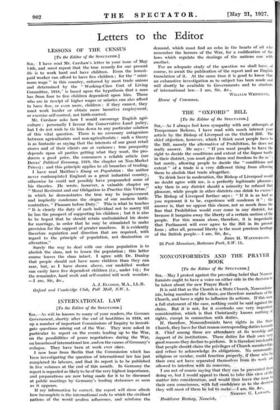Letters to the Editor LESSONS OF THE CENSUS [To the
Editor of the SPECTATOR.] Sin,— I have read Mr. Carshaw's letter in your issue of May 14th, and must repeat that the true remedy for our present ills is to work hard and have children. Even the lowest- paid worker can afford to have five children ; for the mini- mum wage" in this country, enforced by most trade unions and determined by the "Working-Class Cost of Living Committee,. 1918," is based upon the hypothesis that a man has from four to five children dependent upon him. Those who are in receipt of higher wages or salaries can also afford to have five, or even more, children : if they cannot, they must work harder or obtain more lucrative employment, or exercise self-control, not birth-control.
Mr. Carshaw asks how I would encourage English agri- culture: personally I favour the Conservative Land policy, but I do not wish to tic him down to any particular solution of this vital question. There is no necessary antagonism between agriculturists and non-agriculturists : such a theory is as fantastic as saying that the interests of our great retail stores and of their clients are at variance ; true prosperity depends upon all parties getting what they want, the pro- ducers a good price, the consumers a reliable article (see Devas' Political Economy, 1919, the chapter on Non-Market Prices) : and this principle applies to all branches of trading. I have read Malthus's Essay on Population : the author never contemplated England as a great industrial country, otherwise he could not possibly have propounded some of his theories. He wrote, however, a valuable chapter on "Moral Restraint and our Obligation to Practise this Virtue," in which he demonstrates the true way to improvement and impliedly condemns the slogan of our modern birth- controllers, "Pleasure before Duty." This is what he teaches "It is clearly the duty of each individual not to marry till he has the prospect of supporting his children ; but it is also to be hoped that he should retain undiminished his desire for marriage,- in order that he may be stimulated to make provision for the support of greater numbers. It is evidently therefore regulation and direction that are required, with regard to the principle of population, not diminution or alteration."
Surely the way to deal with our slum population is to abolish the slum, not to lessen the population ; this latter course leaves the slum intact. I agree with Dr. Dunlop that people should not have more children than they can rear, but, as I have shown above, our unskilled worker can easily have five dependent children (i.e., under 14) ; for the remainder, hard work and self-control Will work wonders. —I am, Sir, &c.,










































 Previous page
Previous page